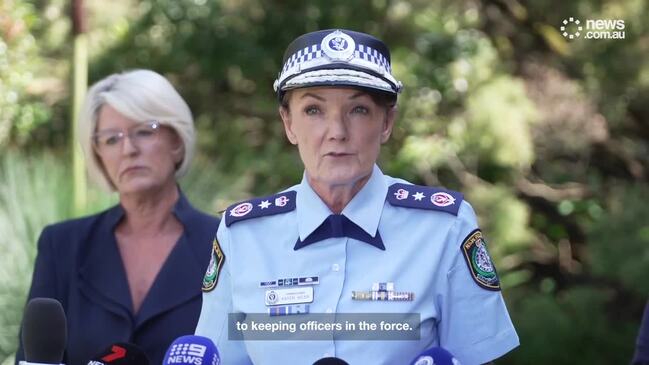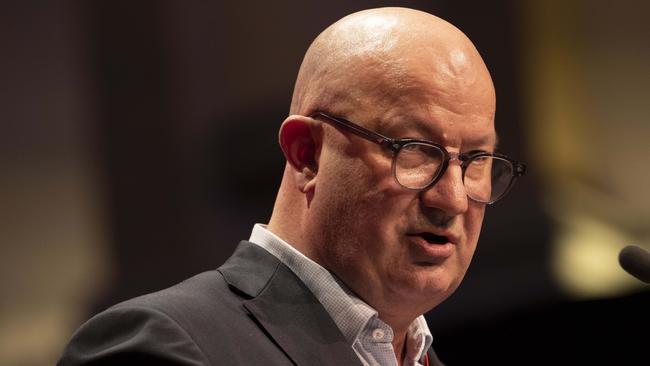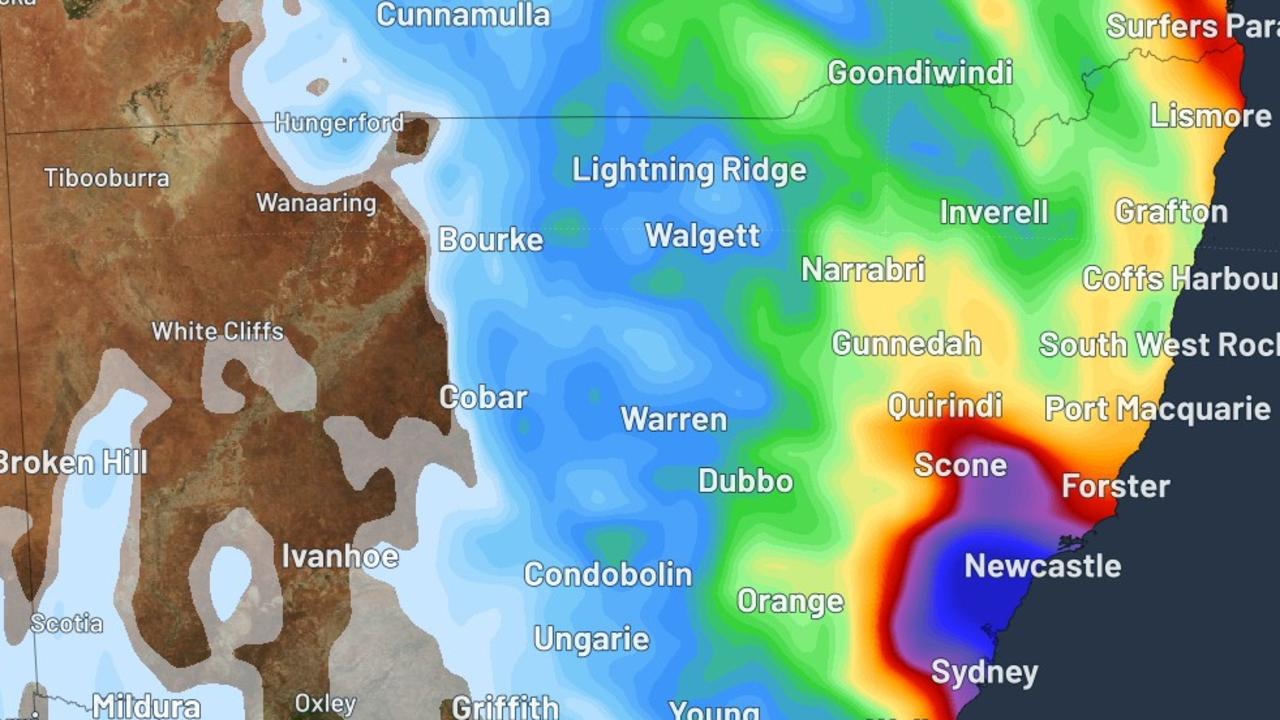‘Choice is clear’: NSW Treasurer’s line in the sand as workers reject compo reform
The NSW Treasurer wants the workers compensation scheme reformed, saying billions are being spent keeping it afloat, but has angered state employees.

Breaking News
Don't miss out on the headlines from Breaking News. Followed categories will be added to My News.
A staggering 95 per cent of essential employees with workplace psychological injury would be “abandoned” under controversial proposed changes to the NSW workers compensation system, unions say.
The Minns government wants to overhaul the workers compensation system to tighten claims for psychological injury, such as post-traumatic stress disorder, saying the number of cases is growing and “unsustainable”.
But Unions NSW says the proposed changes would make it harder for essential workers,
including firefighters and hospital staff, to be eligible to claim damages as a result of psychological injury in the workplace.
Under the government’s proposal, an employee with a permanent impairment for a psychological injury under 31 per cent would not receive compensation. For a physical injury, the threshold would stand at a lower 15 per cent.
A survey of 10,000 essential workers released by the union in the wake of the proposed reforms found 83 per cent believed the changes would force injured colleagues back to work before it was safe, while 60 per cent said they had been exposed to trauma.
“We’re talking about life and death decisions,” union secretary Mark Morey said.
“The government claims this is about financial sustainability, but their 30 per cent impairment threshold would abandon 95 per cent of psychologically injured workers – many of whom are already contemplating suicide.”

A NSW parliament inquiry will on Friday morning begin a hearing into the government’s draft proposal.
Treasurer Daniel Mookhey is expected to tell the hearing the upcoming state budget would report a $2.6bn writedown arising from the Treasury Managed Fund, the government’s self-insurer.
“As the TMF continues to deteriorate, the pressure for cash injections grows,” Mr Mookhey has said.
“Since I became Treasurer, the government has authorised an additional $1.2bn in cash injections to keep the public insurer fully funded.”
Mr Mookhey is expected to say previous Liberal treasurers Dominic Perrottet and Matt Kean had authorised an earlier $4.9bn injection, and that since 2018 the state government had borrowed $6.1bn so that the TMF’s assets equalled its liabilities.
“I will not be authorising any further injections,” Mr Mookhey is expected to tell the hearing.
“Not until parliament decides its collective response to a scheme that most acknowledge is failing.
“Not when that money is coming at the expense of schools, hospitals or kids in need of out-of-home care.
“That choice is clear for me.”

Administered by icare, the TMF is a self-insurance scheme created by the NSW government to insure its agencies’ risks.
As for the nominal insurer, the statutory body that steps in to provide workers’ compensation to employees benefits when an employer is not insured, the picture Mr Mookhey is expected to paint on Friday morning is similarly dire.
At the June 2024 valuation, the nominal insurer held 85 cents for every dollar it expected to pay in compensation and has since them only plunged further into debt.
“Absent reform, I expect the scheme to plunge further into deficit when the scheme is revalued in six weeks,” Mr Mookhey is expected to say.
“Fast deterioration has real implications for sustainability of the scheme.
“Workers get less. Businesses pay more.
“Put simply – you can have the best workers compensation scheme in the world on paper. If it has no money – it helps no one.”
The NSW government previously said the current workplace health and safety and workers compensation laws were failing to both prevent psychological injury and to treat sufferers quickly so that they may be able to return to work.
Only 50 per cent of workers with a psychological injury return to work within a year.
That is compared to 95 per cent of workers with a physical injury under the current system, which the state government said spends seven times more on keeping an injured worker away from the workplace then it does on getting them healthy.

Mr Morey said respondents had shared stories of prolonged battles with the compensation system after suffering psychological injury in the workplace, with some telling the union that they “would not be alive today” if they had not received compensation.
The union reported a Sydney firefighter having disclosed that he “would have certainly taken my own life” had it not been for the compensation system, while another unnamed admin worker said they faced the risk of a “mortgage collapse”.
“The system is already traumatic for injured workers who have to repeatedly prove they’re suffering,” Mr Morey said of the changes.
These changes would make that process virtually impossible for the vast majority of psychological injury claims.
“There’s a better way forward that doesn’t involve abandoning our essential workers.
“When 97 per cent of workers are begging for better mental health support instead of compensation cuts, the government needs to listen before it’s too late.”
More than 10,000 workers were surveyed by Unions NSW between April and May for the Cast Adrift report, with almost half employed in education, as well as staff working in health, transport, local government, and public and emergency services.
Of those respondents, more than 96 per cent identified at least one psychological hazard, while about 30 per cent said they experienced workplace violence or a hazardous physical working environment, and 44 per cent said that they had experienced bullying,
Unions NSW says workers who suffered bullying, sexual or racial harassment in the workplace would be required to go through a “lengthy and expensive” court process to access treatment and support, further jeopardising the prospect of long-term care.
The proposed reforms have also faced pushback from the legal sector, including the Australian Lawyers Alliance whose spokesman, Shane Butcher, in a statement said the draft bill “drastically strips rights away from all workers” in NSW.
“The proposed reforms are significant and will impact all workers injured physically or psychologically in NSW,” Mr Butcher said.
“All workers will have a much harder time accessing the support they need to recover and return to work.
“That is the primary objective of our modern workers compensation system. Nothing in the bill addresses prevention.
“These reforms will dump NSW workers who have suffered a psychological injury due to their work out of the workers compensation scheme.”

The Law Society of NSW president Jennifer Bell also said that while she recognised the workers compensation scheme was under pressure and in need of reform, the proposed changes risked stripping the rights of “some of the community’s most vulnerable”.
“There’s no doubt the sustainability of the current scheme needs addressing, but that should not be at the cost of those people who have sustained serious and debilitating psychological injuries on the job,” Ms Ball said.
“The proposed increase of the ‘whole person impairment’ (WPI) threshold to 31 per cent will conceivably exclude nearly all workers with psychological injury from making a claim.
“To reach 31 per cent WPI, a person would need to demonstrate they’re unable to live alone, care for dependants, or to function in society.”
The Law Society will instead propose a compromise at Friday’s hearing, namely changing the WPI threshold to 21 per cent which Ms Bell said would “ensure that many workers generally recognised by community standards as being severely impacted by mental ill-health would be able to make a claim”.
The hearing begins at 8.30am.
Originally published as ‘Choice is clear’: NSW Treasurer’s line in the sand as workers reject compo reform


